英语动词的解析
英语动词不定式口诀及解析
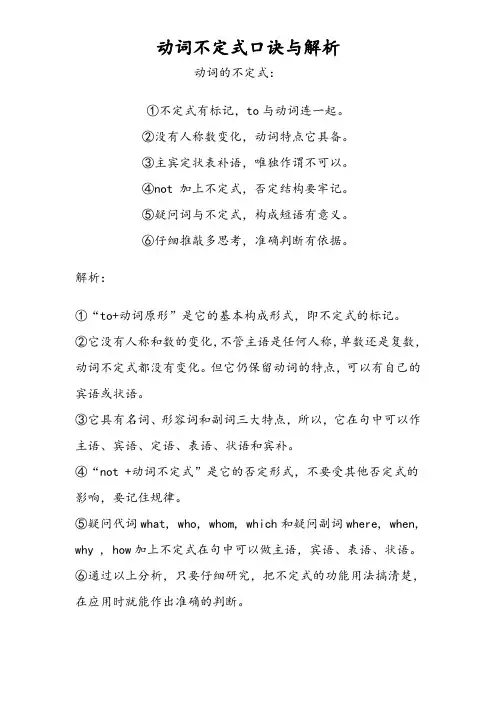
动词的不定式:①不定式有标记,to与动词连一起。
②没有人称数变化,动词特点它具备。
③主宾定状表补语,唯独作谓不可以。
④not 加上不定式,否定结构要牢记。
⑤疑问词与不定式,构成短语有意义。
⑥仔细推敲多思考,准确判断有依据。
解析:①“to+动词原形”是它的基本构成形式,即不定式的标记。
②它没有人称和数的变化,不管主语是任何人称,单数还是复数,动词不定式都没有变化。
但它仍保留动词的特点,可以有自己的宾语或状语。
③它具有名词、形容词和副词三大特点,所以,它在句中可以作主语、宾语、定语、表语、状语和宾补。
④“not +动词不定式”是它的否定形式,不要受其他否定式的影响,要记住规律。
⑤疑问代词what, who, whom, which和疑问副词where, when, why , how加上不定式在句中可以做主语,宾语、表语、状语。
⑥通过以上分析,只要仔细研究,把不定式的功能用法搞清楚,在应用时就能作出准确的判断。
动词不定式结构及用法动词不定式在中学英语中应用非常广泛,一方面在句中可起名词、形容词或副词的作用,同时也可在句中作主语、宾语、定语、状语和宾语补足语。
动词不定式的形式一般是to +动词原形,但to有时要省去。
而动词不定式在具体运用时用不用to,取决于谓语动词的用法。
现就以下几方面介绍如下。
一、不定式结构1. 带to的不定式结构能直接跟带to的不定式结构的动词主要有:want, ask, tell, hope, learn, try, decide, forget, remember, like, love, stop, go, come等。
如:I want to go to the movies with you.我想跟你一起去看电影。
Don’t forget to turn off the light before you leave.在你离开之前别忘了关灯。
注意:动词不定式的否定形式是在不定式前直接加not,即not to do sth.。
英语动词专项习题及答案解析及解析
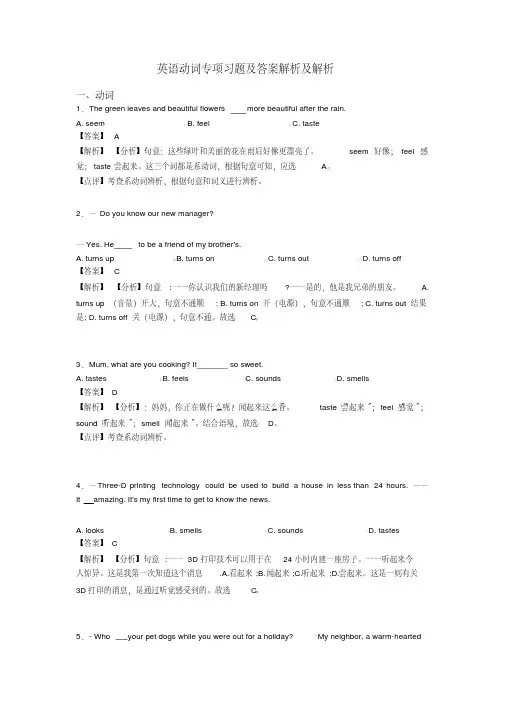
英语动词专项习题及答案解析及解析一、动词1.The green leaves and beautiful flowers more beautiful after the rain.A. seemB. feelC. taste【答案】 A【解析】【分析】句意:这些绿叶和美丽的花在雨后好像更漂亮了。
seem好像;feel感觉;taste尝起来。
这三个词都是系动词,根据句意可知,应选A。
【点评】考查系动词辨析,根据句意和词义进行辨析。
2.— Do you know our new manager?— Yes. He to be a friend of my brother's.A. turns upB. turns onC. turns outD. turns off【答案】 C【解析】【分析】句意:一一你认识我们的新经理吗?一一是的,他是我兄弟的朋友。
A. turns up (音量)开大,句意不通顺; B. turns on开(电源),句意不通顺; C. turns out结果是; D. turns off关(电源),句意不通。
故选C。
3.Mum, what are you cooking? It_______ so sweet.A. tastesB. feelsC. soundsD. smells【答案】D【解析】【分析】:妈妈,你正在做什么呢?闻起来这么香。
taste“尝起来”;feel“感觉”;sound“听起来”;smell“闻起来”。
结合语境,故选D。
【点评】考查系动词辨析。
4.—Three-D printing technology could be used to build a house in less than 24 hours. ——It amazing. It's my first time to get to know the news.A. looksB. smellsC. soundsD. tastes【答案】C【解析】【分析】句意:一一3D打印技术可以用于在24小时内建一座房子。
备战2023年高考英语考点一遍过考点07动词和动词短语含解析
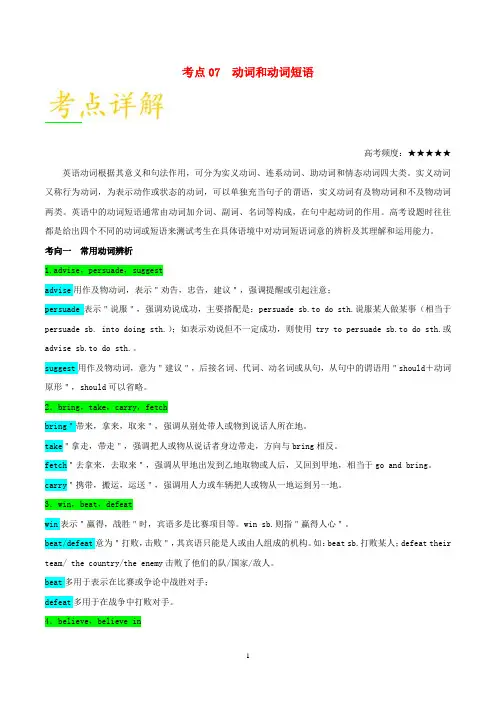
考点07 动词和动词短语高考频度:★★★★★英语动词根据其意义和句法作用,可分为实义动词、连系动词、助动词和情态动词四大类。
实义动词又称行为动词,为表示动作或状态的动词,可以单独充当句子的谓语,实义动词有及物动词和不及物动词两类。
英语中的动词短语通常由动词加介词、副词、名词等构成,在句中起动词的作用。
高考设题时往往都是给出四个不同的动词或短语来测试考生在具体语境中对动词短语词意的辨析及其理解和运用能力。
考向一常用动词辨析1.advise,persuade,suggestadvise用作及物动词,表示"劝告,忠告,建议",强调提醒或引起注意;persuade表示"说服",强调劝说成功,主要搭配是:persuade sb.to do sth.说服某人做某事(相当于persuade sb. into doing sth.);如表示劝说但不一定成功,则使用try to persuade sb.to do sth.或advise sb.to do sth.。
suggest用作及物动词,意为"建议",后接名词、代词、动名词或从句,从句中的谓语用"should+动词原形",should可以省略。
2.bring,take,carry,fetchbring"带来,拿来,取来",强调从别处带人或物到说话人所在地。
take"拿走,带走",强调把人或物从说话者身边带走,方向与bring相反。
fetch"去拿来,去取来",强调从甲地出发到乙地取物或人后,又回到甲地,相当于go and bring。
carry"携带,搬运,运送",强调用人力或车辆把人或物从一地运到另一地。
3.win,beat,defeatwin表示"赢得,战胜"时,宾语多是比赛项目等。
win sb.则指"赢得人心"。
beat/defeat意为"打败,击败",其宾语只能是人或由人组成的机构。
如:beat sb.打败某人;defeat their team/ the country/the enemy击败了他们的队/国家/敌人。
动词时态的全面解析准确运用过去现在和将来时

动词时态的全面解析准确运用过去现在和将来时动词时态的全面解析及准确运用过去、现在和将来时动词时态是英语语法中的一个重要部分,它用来表达动作或状态发生的时间。
正确地运用时态可以使句子更加准确、流畅,并能够有效传达我们所要表达的意思。
本文将对动词时态进行全面解析,并指导如何准确运用过去时、现在时和将来时。
1. 过去时(Past Tense)过去时用于描述已经发生过的动作或状态。
一般过去时表示的是过去某个特定时间发生的动作,例如:I watched a movie last night.(昨晚我看了一部电影。
)He lived in London for five years.(他在伦敦生活了五年。
)除了一般过去时外,过去时还有以下几种形式:1.1 过去进行时(Past Continuous Tense)过去进行时表示过去某一时间正在进行的动作,或过去某一时间段内连续发生的动作,例如:I was watching a movie when she called me.(她给我打电话时,我正在看电影。
)They were playing basketball from 4 pm to 6 pm yesterday.(昨天从下午4点到6点,他们一直在打篮球。
)1.2 过去完成时(Past Perfect Tense)过去完成时表示在过去某个时间之前已经发生的动作,例如:She had already finished her homework before he arrived.(他到之前她已经完成了作业。
)They had known each other for ten years before they got married.(他们在结婚前已经认识了十年。
)1.3 过去完成进行时(Past Perfect Continuous Tense)过去完成进行时表示过去某一时间之前一直在进行的动作,例如:I had been waiting for two hours when the bus finally arrived.(公交车最终到达时,我已经等了两个小时了。
2023年初中英语语法之实义动词与感官动词的用法解析
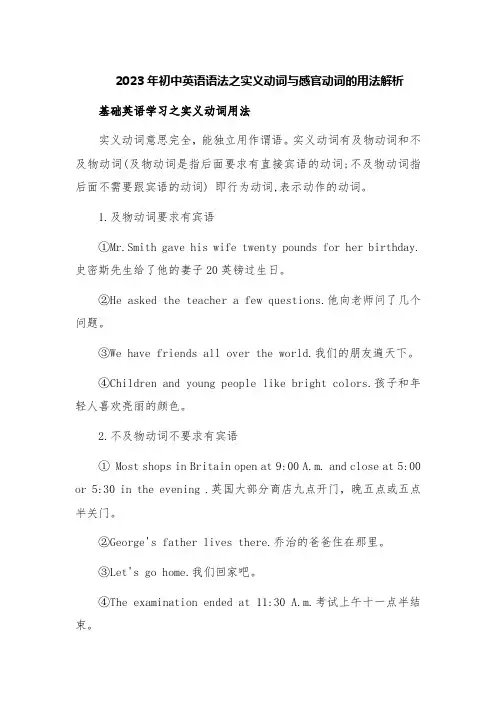
2023年初中英语语法之实义动词与感官动词的用法解析基础英语学习之实义动词用法实义动词意思完全,能独立用作谓语。
实义动词有及物动词和不及物动词(及物动词是指后面要求有直接宾语的动词;不及物动词指后面不需要跟宾语的动词) 即行为动词,表示动作的动词。
1.及物动词要求有宾语①Mr.Smith gave his wife twenty pounds for her birthday.史密斯先生给了他的妻子20英镑过生日。
②He asked the teacher a few questions.他向老师问了几个问题。
③We have friends all over the world.我们的朋友遍天下。
④Children and young people like bright colors.孩子和年轻人喜欢亮丽的颜色。
2.不及物动词不要求有宾语① Most shops in Britain open at 9:00 A.m. and close at 5:00 or 5:30 in the evening .英国大部分商店九点开门,晚五点或五点半关门。
②George's father lives there.乔治的爸爸住在那里。
③Let's go home.我们回家吧。
④The examination ended at 11:30 A.m.考试上午十一点半结束。
3.特殊实义动词英语动词很多既是及物动词又是不及物动词,如close, begin, study, leave, work等。
①The post office closes at 9:00 p. m.邮局晚上9点关门。
②Close the window,please.请关窗。
③Shall we begin now?我们现在开始吗?④ Bill began working as a sailor after he left school.比尔毕业后当水手。
人教版英语情态动词(完整版)含解析
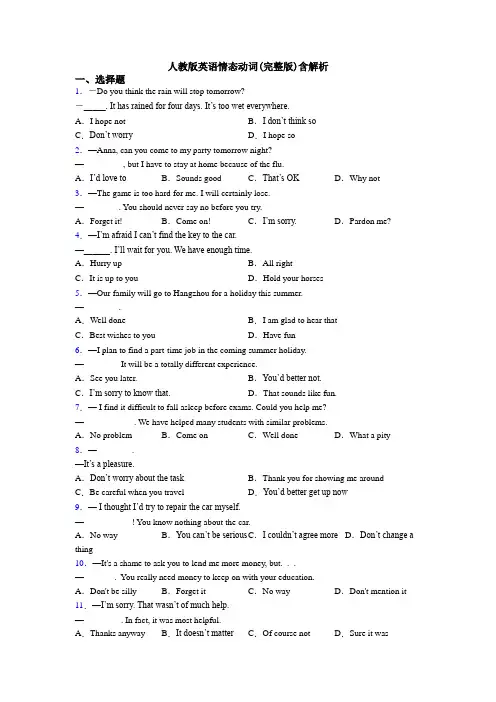
人教版英语情态动词(完整版)含解析一、选择题1.-Do you think the rain will stop tomorrow?-_____. It has rained for four days. It’s too wet everywhere.A.I hope not B.I don’t think soC.Don’t worry D.I hope so2.—Anna, can you come to my party tomorrow night?—_________, but I have to stay at home because of the flu.A.I’d love to B.Sounds good C.That’s OK D.Why not 3.—The game is too hard for me. I will certainly lose.—________. You should never say no before you try.A.Forget it! B.Come on! C.I’m sorry.D.Pardon me? 4.—I’m afraid I can’t find the key to the car.—______. I’ll wait for you. We have enough time.A.Hurry up B.All rightC.It is up to you D.Hold your horses5.—Our family will go to Hangzhou for a holiday this summer.—________.A.Well done B.I am glad to hear thatC.Best wishes to you D.Have fun6.—I plan to find a part-time job in the coming summer holiday.—________ It will be a totally different experience.A.See you later. B.You’d better not.C.I’m sorry to know that.D.That sounds like fun.7.— I find it difficult to fall asleep before exams. Could you help me?— ___________. We have helped many students with similar problems.A.No problem B.Come on C.Well done D.What a pity 8.—________.—It’s a pleasure.A.Don’t worry about the task B.Thank you for showing me aroundC.Be careful when you travel D.You’d better get up now9.—I thought I’d try to repair the car myself.— __________ ! You know nothing about the car.A.No way B.You can’t be serious C.I couldn’t agree more D.Don’t change a thing10.—It's a shame to ask you to lend me more money, but. . .— ______ . You really need money to keep on with your education.A.Don't be silly B.Forget it C.No way D.Don't mention it 11.—I’m sorry. That wasn’t of much help.— ________. In fact, it was most helpful.A.Thanks anyway B.It doesn’t matter C.Of course not D.Sure it was12.—I’m so sorry to keep you waiting for me so long.— ________!A.With pleasure. B.Don’t say so C.I don’t think so D.It doesn’t matter 13.—I prefer western food. It’s delicious and good for us.—_______ ? But western food is said to be high in sugar and fat.A.Is that right B.How do you know thatC.Do you really think so D.Who told you that14.—Can I look at the menu for a few more minutes before I decide?—Of course. ________, Sir.A.Make yourself at home B.Enjoy yourself C.It doesn’t matterD.Take your time15.— Could you please clean your room?—_________. I’ll do it at once.A.Yes, sure B.Sorry, I can’t C.It doesn’t matter D.Here you are 16.— What do you think of the movie Mr. Bea ?— ____. It’s very funny.A.I can’t stand it .B.I don’t mind it C.I love it. D.I hate it. 17.—Would you please help me with my spoken English?—__________. First you should know practice makes perfect.A.That’s right B.No problem C.Quite well D.No, thanks 18.— Shall we go to Nanjing Green Expo Park to enjoy the beautiful flowers this afternoon?—________. Let’s go there by bike.A.I think so B.That’s all right C.My pleasure D.Sounds great 19.—I have got a new job as a presenter in the Wenzhou Radio Station!—________.A.Come on B.Good idea C.Congratulations D.All right 20.—Why not take your son to watch the new film A Little Red Flower?—__________.A.Good idea B.No problem C.Good luck D.No way 21.—Do you like cartoons or scary movies?—_______. They can cheer me up.A.Yes, I do B.No, I don't C.Cartoons D.Scary movies 22.—Excuse me, can you give me some water? The cup is empty.—________A.Go ahead. B.My pleasure C.At your service D.You’d better not. 23.—You seem so happy today, Jack.—________? I won the first prize in the singing competition yesterday.A.So what B.How come C.Guess what D.Why not 24.—Susan, will you please go and empty that drawer?— _________ ?A.What for B.What is it C.How is it D.How come 25.—It’s been a wonderful party. Thank you very much?—- ________________.A.With pleasure B.No , thanks C.It’s OK D.I’m glad you enjoyed it .26.—________!—Yes. It sounds gentle and relaxing.A.How good the vegetable soup is B.How exciting the storybook isC.What nice music Ann is playing D.What a beautiful flower Jim keeps 27.—All of Mark Twain’s novels are popular.— ________. Especially The Adventures of Tom Sawyer.A.I can’t agree more B.That’s not the case C.That’s not the point D.Don’t mention it 28.—How would you like your soup?—________.A.Very delicious B.With some tomatoes and eggs, pleaseC.I like it very much D.No, thanks29.—Don’t keep the water running when you brush your teeth.— ________ .A.I hope so B.I’m afraid not C.Sorry, I won’t D.It’s nothing 30.— Why will you take part in the charity walk? You are not good at running at all.— ________. I run to show that I can help others.A.Not exactly B.That’s not the point C.I can’t agree more D.It sounds like a pity 31.—Shall we go to the amusement park right away or the day after tomorrow?—________. Any time will do.A.Excuse me B.Have a good timeC.It’s up to you D.I’m afraid I can’t32.—How do you like coffee, Minnie?—It tastes very terrible. ________.A.I have no idea B.I don’t mind it C.I really can’t stand it D.I can’t afford it 33.— Mr. Smith, I won the first prize in the competition.—______ I think you’ll do better and better.A.Congratulations! B.Good idea! C.That’s all right!D.What a shame! 34.—Oh, my love, you say you have ordered a dozen cups of bubble tea (奶茶)?—________A.Agree. B.Forget it. C.I really do. D.Are you kidding me? 35.—He is too short to be a successful basketball player.—________ Every dog has its day.A.I think so. B.It’s hard to say.C.That’s right.D.You’d better not. 36.— May I have a look at the newspaper China Daily?— Certainly. ________A.Thank you. B.It’s a pity.C.Here you are. D.I’d like to. 37.—I just got a message from Ms. Yang and she said she would come to our meeting this afternoon.— She always has good ideas.A.Why not? B.What a pity! C.Time is up. D.That’ll be very nice. 38.— Mike, are you ready for the coming final exam?— ________. I have prepared it for weeks.A.You bet B.No deal C.Bad luck D.Have fun 39.—Can you tell me how to get to the park?—________—Thank you all the same.A.Show me the map, please.B.Certainly. It’s opposite the museum.C.Sorry, I don’t know. I’m a stranger here.D.Sure. Turn right and go along Rock Road.40.—How about buying that coat?—________. It’s too expensive. I can’t afford it.A.That sounds good B.No way C.Good idea D.What a pity 41.—I wonder if Tenny is doing well in her new school.—________. She is old enough to look after herself well.A.You’re welcome B.Good luck C.It’s a pity D.No need to worry 42.— Wow, what a good smell! Can I have a piece of cake?— ________A.No way. B.Good idea! C.HeIp yourself. D.What a pity! 43.— Would you mind my turning on the TV? The New Year concert has just begun.— ________. Just go ahead.A.Please don’t B.Better not C.Of course not D.I’m afraid not 44.—Mum, Joe has broken a cup!—________. Accidents always happen.A.Pretty good B.Of course C.It doesn’t matter D.That depends 45.—We’ll study in different schools next term. I hope you’ll enjoy your time in the new school!—________A.I’ll take your advice. B.The same to you. C.Congratulations!D.It doesn’t matter.46.— The movie Lost in Russia sends a message about the importance of family.— ________. It reminds me of my parents.A.I hope so B.That’s all right C.You bet D.I don’t think so 47.— Michael was late for Mr. Smi th’s chemistry class this morning.—________? As far as I know, he never came late to class.A.So what B.Why not C.How come D.Who cares 48.— Are you feeling any better now after taking the medicine?—________. I’m feeling even worse.A.You got it B.Never mind C.Sorry to hear that D.Quite the opposite49.—Another Friday! Let’s go to see the play tonight.—________ I will book the tickets online.A.My pleasure. B.That’s right.C.Why not? D.Never mind. 50.—I love the Internet. I’ve come to know many friends on the net.—________. Few of them would become your real friends.A.I can’t agree more B.I’m pleased to know thatC.That’s for sure D.That’s not the case【参考答案】***试卷处理标记,请不要删除一、选择题1.D【解析】试题分析:I hope not我希望不是,I don’t think so我不认为这样,Don’t worry不要担心,I hope so我希望如此。
英语系动词的作用与基本用法(含大量例句)
英语系动词的作用与基本用法一、引言英语系动词在英语语法中扮演着非常重要的角色。
它具有丰富的用法和变换形式,对句子的结构和意思发挥着至关重要的作用。
随着我们深入学习和使用英语,对英语系动词的理解和掌握将会变得越来越重要。
在本文中,我们将会系统地探讨英语系动词的作用与基本用法,并提供大量的例句进行解释和说明。
二、英语系动词的概念英语系动词是指表示状态、感觉、想法等概念的动词,它们通常用来连接主语和表语,构成系表结构。
最常见的英语系动词包括be动词(am, is, are, was, were)、appear、become、seem、feel、look、sound等。
英语系动词不表示动作,而是表示状态或性质,因此它们常常用来描述事物的特征、状态或表达主观感受。
在句子中,英语系动词起到连接主语和表语的作用,帮助构成陈述句、疑问句和否定句等语法结构。
三、英语系动词的基本用法1. be动词的基本用法be动词是英语中最常见的系动词之一,它在句子中充当系动词、情态动词和助动词的角色。
be动词的基本形式包括am、is、are、was、were,它们分别对应于不同的时态和人称。
例如:- She is a teacher. (她是一名老师)- They were happy. (他们很快乐)2. appear、become、seem等系动词的基本用法除了be动词之外,英语中还有许多其他系动词,它们在句子中同样起到连接主语和表语的作用。
这些系动词包括appear(出现)、become(变成)、seem(似乎)等,它们通常用来描述事物的状态、变化或表达人的感受。
例如:- The sun appears bright. (太阳看起来很明亮)- She became a doctor. (她成为了一名医生)- He seems tired. (他看起来很累)四、英语系动词的深度解析在实际运用中,英语系动词的用法非常灵活多样,需要根据具体的语境和情境来进行准确的选择和搭配。
英语动词分类解析
微型课题英语动词的分类在高中英语教学中,有很多学生不明白该如何使用be动词及其它动词,不管是写句子还是说话,一提笔或一张口就是I’m接动词原形。
经过反复强调和纠正,学生仍然是一用就错。
显然,这是由于他们中学时英语掌握得不够扎实,对很多语法现象知之甚少且未能理顺,加上头脑中储存的正确句型甚少造成的。
实际上,be动词及其组合的动词的用法看似简单,实则较为复杂且是英语学习中的重、难点所在,若掌握了动词及其运用规则,再积累一些单词和句型,英语的运用就不是那么困难了。
动词是表示动作或状态的词,在句中具有时态、语态、语气、语体等语法特征。
1.从作用来看,动词可分为助动词(primary auxiliary)和主动词(main verb)即实义动词(lexical verb)。
1.1.实义动词是指具有实际动作含义的动词。
如talk,smile,dance,work等都表示一定的动作,因此被称为实义动词。
1.2.助动词是用来辅助实义动词构成时态、语态、否定、疑问等的词。
它包括基本助动词do,be,have;情态助动词即我们平时所指的情态动词shall,should,will,would,can,could,may,might,must,dare,need,ought to,used to等约十三个词,以及半助动词have to。
2.实义动词的分类:2.1.及物动词(transitive verb)和不及物动词(intransitive verb)及物动词(vt.)后一般接人或物做宾语,比如:tell sb.sth.中tell是及物动词,sb.是它的间接宾语,sth.是直接宾语,知道了这个词的结构,我们就可以将sb.,sth.替换成具体的词,如:tell him a story,tell me a lie,tell jokes,tell sb.that…,tell sb.to do sth…那么再将短语扩展成句子也就不难了,比如My brother loves telling jokes.He told me a lie yesterday.He told me that he would lend me his bookafter he finished reading it.The secretary told me to wait for a fewminutes.不及物动词(vi.)后一般加一些介词或副词才能带宾语。
初中英语及物动词与不及物动词区分及解析
初中英语及物动词与不及物动词区分及解析一、及物动词后面必须跟宾语意义才完整的实义动词,叫做及物动词(transitive verb)。
有的动词必须接一个宾语,有的必须接两个宾语。
如:1. "主+谓+宾";I have a book.2. "主+谓+双宾";(双宾语:间接宾语和直接宾语)Mr Zhang teaches us English.(双宾语:us是间接宾语,English是直接宾语)3. "主+谓+宾+宾补"结构。
也叫“主谓复合宾语”They asked me to go fishing.(me为宾语,不定式to go fishing是宾语补足语)二、不及物动词本身意义完整后面不须跟宾语的实义动词,叫做不及物动词(intransitive verb)。
1. "主+谓"结构。
My watch stopped.2. "主+谓+介词+宾语"结构。
He is looking at me.*注意:不及物动词没有被动语态。
三、兼作及物动词和不及物动词英语里有不少实义动词可以兼作及物动词和不及物动词。
这样的动词又有两种不同的情况:a) 意义不变。
When did they leave Chicago?他们是什么时候离开芝加哥的?(leave作及物动词)They left last week.他们是上周离开的。
(leave作不及物动词)b) 意义不相同。
Wash your hands before meals.饭前要洗手。
Does this cloth wash well?这布经得起洗吗?四、及物动词与不及物动词的区别1. 根据是否加宾语及物动词后加宾语;不及物动词后不直接加宾语,若想加宾语,必须加介词。
比如,“员工正在看表”,可以翻译成:Employees are watching the clock. (√)或者:Employees are looking at the clock. (√)因为watch是及物动词,后面直接加宾语the clock。
初中英语中的情态动词用法解析
初中英语中的情态动词用法解析情态动词是英语中一个非常重要的语法现象,它们在句子中起到了承上启下的作用。
在初中英语学习中,我们经常会遇到情态动词的使用,但是很多学生对其用法还存在一些困惑。
本文将详细解析初中英语中的情态动词用法,帮助大家更好地理解和运用。
一、情态动词的定义和特点情态动词是一类特殊的助动词,用来表示说话人对某种行为或状态的态度、意愿、推测、能力等。
常见的情态动词包括can、could、may、might、must、shall、should、will、would等。
情态动词具有以下特点:1. 情态动词没有人称和数的变化,即主语是什么,情态动词就是什么形式。
2. 情态动词后面直接跟动词原形,不加to。
3. 情态动词本身没有时态,它们通过上下文来表示不同的时态。
4. 情态动词后面的动词要用原形,不能加-ing。
二、情态动词的用法1. 表示能力和可能性情态动词can表示能力,表示某人有能力做某事。
例如:I can swim.(我会游泳。
)情态动词may表示可能性,表示某事有可能发生。
例如:It may rain tomorrow.(明天可能会下雨。
)2. 表示许可和禁止情态动词can表示许可,表示某人允许做某事。
例如:Can I go to the park?(我可以去公园吗?)情态动词must表示禁止,表示某人不允许做某事。
例如:You must not smoke here.(你不能在这里吸烟。
)3. 表示推测和猜测情态动词may和might表示推测,表示某事可能发生或某人可能做某事。
例如:He may be busy.(他可能很忙。
)情态动词must表示肯定的推测,表示某事几乎可以肯定。
例如:She must be tired.(她一定很累。
)4. 表示义务和建议情态动词must表示义务,表示某人有责任做某事。
例如:You must finish your homework.(你必须完成作业。
- 1、下载文档前请自行甄别文档内容的完整性,平台不提供额外的编辑、内容补充、找答案等附加服务。
- 2、"仅部分预览"的文档,不可在线预览部分如存在完整性等问题,可反馈申请退款(可完整预览的文档不适用该条件!)。
- 3、如文档侵犯您的权益,请联系客服反馈,我们会尽快为您处理(人工客服工作时间:9:00-18:30)。
英语动词的解析
简单句I love you.
vi.不及物动词
一部分
Frank is reading.
Birds can fly.
两部分
Frank complained about the traffic. (+介词) The meeting lasted (for) three hours. (+介词) Don’t hesitate to phone the office. (+不定式) It seemed that you did wrong. (+从句)
Frank studied here two years ago. (+状语) Frank is studying in the classroom. (+状语) The kite is flying high. (+状语)
Signal to the waiter to bring another chair. Announce to journalists that the dispute has been settled.
Indicate to the team where they are to assemble.
Indicate to the team where to assemble.
L.联系动词
Frank became a teacher. (+名词)
Frank fell into a doze. (+介词)
Bill is rich. (+形容词)
The girl flushed up at the words. (+副词)
The small town remained unchanged. (+分词) The film was exciting. (+分词)
Frank is to go when it rains. (+不定式)
Is this one? No, not that one. (+代词)
One and one is two. (+数词)
This is because Frank was late. (+从句) Frank is not what he used to be. (+从句)
Vt. 及物动词
一部分
Open the door. (+名词)
We got it. (+代词)
Frank hated to drive in the rush hour. (+to) Frank helped wash the dishes. (+to)
Frank enjoyed playing football. (+ing)
Frank believed that it is possible. (+从句) Frank decided that we should do next. (+从句) Frank decided what to do next. (+疑问词+to)
“It’s snowing,” she said. (+直接引语)
两部分
We elect him monitor. He gave me a book. (+宾语+名词)
We convinced the court of his innocence.
We found the old man in good health.
Shake the medicine up.
Ask me to help him.
Warn the actors not to be late.
Spot a man waving in the crowd.
Get the traffic moving.
Frank had his hair cut.
Watch the man cross the road.
Let the children play in the road.
Accept the story as the truth (genuine). Remind guests where they should leave their luggage.
“Frank is coming to lunch,” she told me. Frank informed me that he would come.
三部分
Tom made it clear that he would resign. Following these suggestions will make it easier to pick up all the rubbish.。
